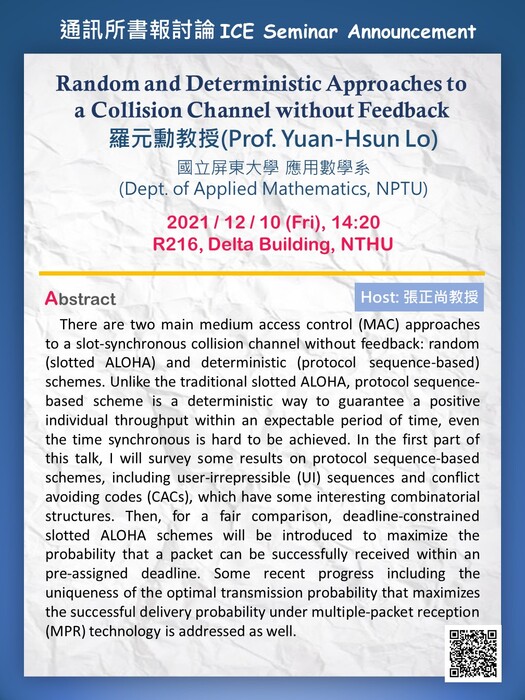2021/12/10(Fri.) 14:20- 羅元勳 教授 (Prof. Yuan-Hsun Lo) 國立屏東大學 應用數學系 (Dept. of Applied Mathematics, NPTU) - Random and Deterministic Approaches to a Collision Channel without Feedback

Date & Time:
2021 / 12 / 10 (Fri) 14:20 - 16:20
Location:
Delta Building R216, NTHU
Speaker:
羅元勳 教授 (Prof. Yuan-Hsun Lo)
國立屏東大學 應用數學系 (Dept. of Applied Mathematics, NPTU)
Topic:
Random and Deterministic Approaches to a Collision Channel without Feedback
Abstract:
There are two main medium access control (MAC) approaches to a slot-synchronous collision channel without feedback: random (slotted ALOHA) and deterministic (protocol sequence-based) schemes. Unlike the traditional slotted ALOHA, protocol sequence-based scheme is a deterministic way to guarantee a positive individual throughput within an expectable period of time, even the time synchronous is hard to be achieved. In the first part of this talk, I will survey some results on protocol sequence-based schemes, including user-irrepressible (UI) sequences and conflict avoiding codes (CACs), which have some interesting combinatorial structures. Then, for a fair comparison, deadline-constrained slotted ALOHA schemes will be introduced to maximize the probability that a packet can be successfully received within an pre-assigned deadline. Some recent progress including the uniqueness of the optimal transmission probability that maximizes the successful delivery probability under multiple-packet reception (MPR) technology is addressed as well.
Bio:
Yuan-Hsun Lo received the B.S., M.S., and Ph. D. degrees from National Chiao Tung University, Taiwan, in 2004, 2006, and 2010, respectively, all in applied mathematics. From 2011 to 2015, he was employed as a postdoc in National Chiao Tung University, National Kaohsiung University, and National Taiwan Normal University, Taiwan. After teaching and researching with the School of Mathematical Sciences in Xiamen University, China, for four years, he joined National Pingtung University in 2019, and is currently an Associate Professor with the Department of Applied Mathematics. His current research interests include combinatorics, graph theory, combinatorial design theory and their applications, especially on wireless communications.

